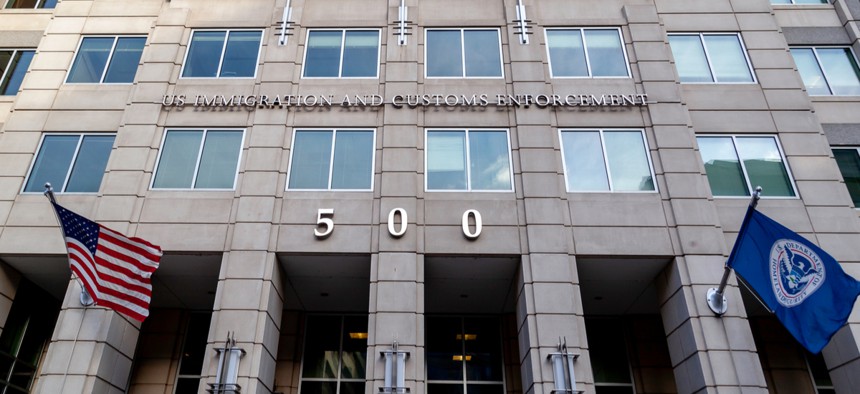Immigrants Might Be Reporting Crimes Even Less Now. Here's Why

The U.S. Immigration and Customs Enforcement building in Washington, D.C. The Trump Administration has cracked down on immigration including undermining protections of the U nonimmigrant visa. SHUTTERSTOCK

Connecting state and local government leaders
COMMENTARY | The Trump administration’s decision to create doubt about the validity of U visas that protect crime survivors hurts already vulnerable immigrant populations.
The Trump administration showed its animus toward immigration of any kind in its recent short-lived plan to deny visas to foreign students if they were only enrolled in online classes. Although the Department of Homeland Security quickly rescinded its restrictions after widespread opposition from universities and states, the proposal echoed another outrageous recent immigration policy that has received far too little attention: the potential deportation of immigrants who are survivors of or witnesses to crimes.
Codified in the 2000 Victims of Trafficking and Violence Protection Act, the U nonimmigrant visa (U visa) protects “victims of certain crimes who have suffered mental or physical abuse and are helpful to law enforcement or government officials in the investigation or prosecution of criminal activity.”
Prior to this law, non-citizens who were victims of crime reasonably feared that calling the police, cooperating with prosecutors and testifying in courts put them at heightened risk of deportation. Indeed, vulnerable populations like immigrants are often criminal targets precisely because they are less likely to report crimes and cooperate with law enforcement.
A directive the Trump administration issued last year now permits Immigration and Customs Enforcement (ICE) officers to deport U visa holders at their “discretion.” This should be of immediate concern for all law enforcement officers, prosecutors and communities. Absent the confidence to cooperate with law enforcement to report crimes without jeopardizing their status, non-citizen crime victims are all the more likely to be paralyzed with fear of action after their victimization.
Issuing U visas is a meticulous process. Applications are advanced by a prosecutor after careful analysis of the victim’s circumstances and the context of the pending case. A comprehensive request is then filed with thorough documentation proving that the applicant is indeed assisting in a criminal investigation. After such a request is filed, the petition is reviewed by ICE and ultimately an immigration judge. If granted, an applicant may legally remain in the United States for four years, after which he or she is eligible to apply for a green card to remain permanently. This thoughtful policy, enacted with bipartisan support in Congress, has provided thousands of people with a meaningful path to citizenship with roughly 80% of petitions on which a decision has been rendered approved between 2009 and 2018. The U visa program confers de facto residency on more people than the visa lottery or refugee program.
As a former long-time prosecutor, I know first-hand how devastating this policy can be in the pursuit of justice. Consider the 2007 case of Marco, who was the victim of a home invasion where four masked gunmen knocked down his apartment door. They proceeded to rob and torture him and two roommates—including inserting a wire hanger into one of their genitalia. Marco feared: first, for his life, and, second, deportation. Thankfully, federal law permitted the prosecutor on the case to assure Marco (whose real name I’m not using to protect his identity) that his cooperation with the investigation wouldn’t lead to his forced removal from the country he had called home for years. Working with his attorney, a victim advocate, and the prosecutor, Marco secured a U visa, resulting in him testifying before the grand jury. Eventually, the gunmen were convicted of their crimes. This result was an unquestionable positive for the community as a whole, including others in the city who might have been victims of these perpetrators.
Threatening to deport crime victims undermines the willingness of victims’ like Marco to be heard and to seek justice. This makes it all the more difficult to ensure that those who commit crimes don’t do so again and that survivors of crime are treated with dignity as valued members of their community.
In crippling our most vulnerable populations, the directive to deny U visas for crime victims jeopardizes everyone. All public servants, including professors, prosecutors, police and others must rally together to speak out against policies that decrease the safety and security of the communities we live in.
Lucy Lang is the director of the Institute for Innovation in Prosecution at John Jay College of Criminal Justice, and formerly a prosecutor in Manhattan. She teaches criminal justice in New York State prisons.

NEXT STORY: His Wife's Nursing Home Facility Went on Lockdown. So He Got a Job There.




